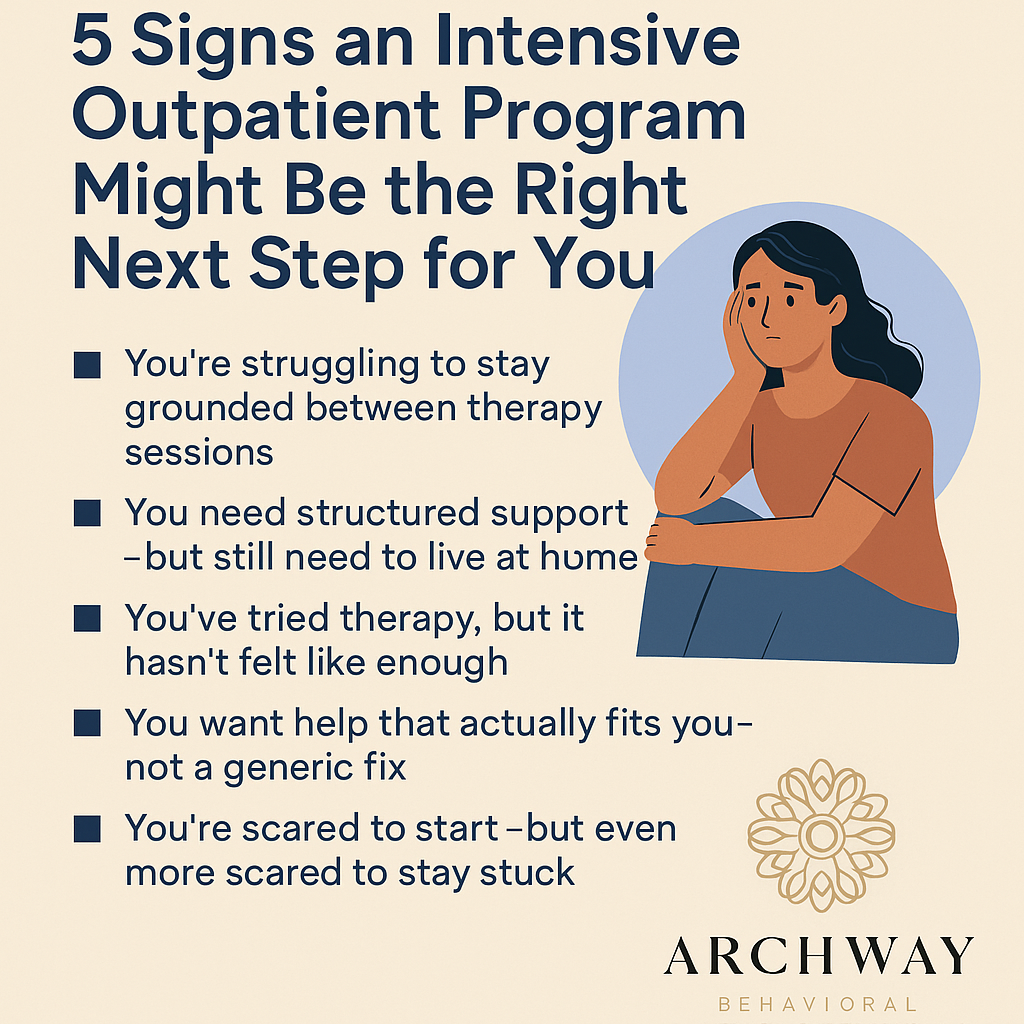When you’re newly diagnosed, your mind can feel like it’s moving a hundred miles an hour. You’re trying to make sense of what this diagnosis means, what treatment options are out there, and—most confusing of all—what you actually need.
If weekly therapy isn’t quite enough, but the idea of going into a full-time treatment facility feels too overwhelming or out of reach, there’s a middle ground. It’s called an intensive outpatient program (IOP)—and it might be exactly the kind of structure and support you’re looking for right now.
At Archway Behavioral Health in Boca Raton, Florida, we understand that early recovery is a fragile window. You don’t have to figure it all out at once. You just need one clear next step.
Here are five signs that IOP might be the right one.
1. You’re struggling to stay grounded between therapy sessions
Maybe you’ve started therapy. Maybe you’re journaling, trying new coping skills, doing the “right” things. But something isn’t clicking. Between sessions, you find yourself overwhelmed, spinning in anxiety, or slipping into old habits.
This doesn’t mean you’re failing—it just means you may need more support than one hour a week can offer.
IOP bridges that gap. You get multiple touchpoints each week (often 3–5 days), including group therapy, individual counseling, and skill-building support. The consistency helps reduce emotional whiplash and gives you tools that work in the real world.
2. You need structured support—but still need to live at home
Many people hesitate to get help because they think it means stepping away from everything—home, work, school, relationships. But for a lot of people, that’s not just unrealistic. It’s impossible.
An intensive outpatient program lets you live your life while getting help. At Archway, you can attend programming during the day or evening, depending on your needs. This flexibility makes it possible to keep your commitments while prioritizing your health.
You don’t have to wait for a crisis or take your life apart to get the help you need.
3. You’ve tried therapy, but it hasn’t felt like enough
If you’ve done the therapy thing and still feel stuck, it’s not a sign that you’re broken—or that therapy doesn’t work. It just might mean you need a more integrated approach.
IOP is therapy, plus. It offers:
- Group therapy for connection and accountability
- Individual therapy for depth and personalization
- Psychoeducation to help you understand what’s happening in your brain and body
- Skill-building to manage anxiety, triggers, and tough moments in real life
It’s a cohesive treatment plan, not a scatter of appointments. That clarity alone can be a game-changer.

4. You want help that actually fits you—not a generic fix
Mental health diagnoses can feel like they reduce you to a label. But you are not your diagnosis. You’re a whole person, with history, identity, relationships, and values that matter.
At Archway, our intensive outpatient program in Boca Raton is designed to be responsive—not rigid. That means:
- We adapt treatment plans to your needs and learning style.
- We recognize intersectional challenges (gender identity, trauma, culture, etc.).
- We welcome your voice in your own healing process.
Whether you’re scared to take medication, unsure if you belong in treatment, or just overwhelmed by the whole thing—you’ll be met with respect and understanding here.
5. You’re scared to start—but even more scared to stay stuck
It’s normal to be hesitant about starting IOP. You might be wondering:
- What if I start and it’s too much?
- What if I can’t do it right?
- What if it doesn’t help me at all?
But underneath those fears, many people feel an even deeper one: What if nothing changes?
IOP is often the step that helps people move out of survival mode. It’s not a magic solution—but it gives you structure, tools, and support so you don’t have to navigate your mental health alone.
You don’t have to be “sure” to take a step. You just have to be willing to try.
FAQ: What You Might Still Be Wondering
What exactly is an intensive outpatient program (IOP)?
An IOP is a structured mental health treatment program that allows you to live at home while attending sessions multiple times per week. It includes group and individual therapy, education, and support tailored to your needs. At Archway, most IOP clients attend 3–5 days per week for 3–4 hours per day.
How is IOP different from inpatient treatment or PHP?
Inpatient and PHP (partial hospitalization programs) require more time and often include medical supervision. IOP offers a lower level of care that still provides structure and support—but with more flexibility. It’s ideal for people who need more than weekly therapy, but don’t need 24/7 care.
Is IOP only for addiction?
No. At Archway, we treat a range of mental health conditions in IOP, including anxiety, depression, trauma, mood disorders, and dual diagnosis cases. You do not need to be struggling with substance use to benefit from an IOP.
Can I work or go to school during IOP?
Yes. One of the biggest benefits of IOP is its flexibility. Many of our clients continue working or attending school while in the program. We’ll work with you to find a schedule that supports your life—not disrupts it.
Is this the right time to start IOP?
There’s no perfect time. But if you’re reading this and feeling something stir—some mix of curiosity, fear, hope—that’s a sign. You don’t have to wait until you’re in crisis to seek help. IOP can be a proactive, powerful next step.
📞 Let’s Talk—You Don’t Have to Decide Alone
If you’re unsure about IOP but think it might be worth exploring, we invite you to start a conversation. At Archway Behavioral Health, we’ll walk you through what IOP looks like, answer your questions honestly, and help you figure out what’s right for you—not just what looks good on paper.
Call us today at 888-488-4103
Or learn more about our intensive outpatient program in Boca Raton.
You’re not too late. You’re not too early. You’re right on time to get the support you need.


